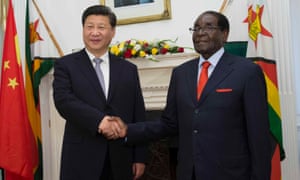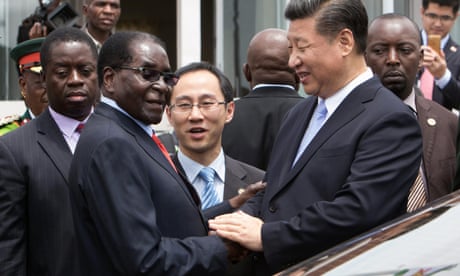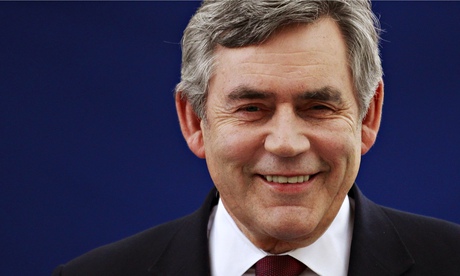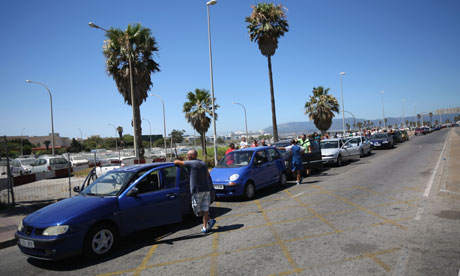George Monbiot in The Guardian
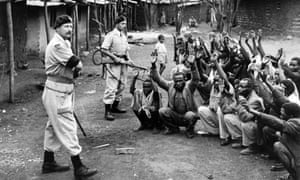
Members of the Devon Regiment round up local people in a search for Mau Mau fighters in Kenya in 1954. Photograph: Popperfoto/Popperfoto/Getty Images
There is one thing you can say for the Holocaust deniers: at least they know what they are denying. In order to sustain the lies they tell, they must engage in strenuous falsification. To dismiss Britain's colonial atrocities, no such effort is required. Most people appear to be unaware that anything needs to be denied.
The story of benign imperialism, whose overriding purpose was not to seize land, labour and commodities but to teach the natives English, table manners and double-entry book-keeping, is a myth that has been carefully propagated by the rightwing press. But it draws its power from a remarkable national ability to airbrush and disregard our past.
Last week's revelations, that the British government systematically destroyed the documents detailing mistreatment of its colonial subjects, and that the Foreign Office then lied about a secret cache of files containing lesser revelations, is by any standards a big story. But it was either ignored or consigned to a footnote by most of the British press. I was unable to find any mention of the secret archive on the Telegraph's website. The Mail's only coverage, as far as I can determine, was an opinion piece by a historian called Lawrence James, who used the occasion to insist that any deficiencies in the management of the colonies were the work of "a sprinkling of misfits, incompetents and bullies", while everyone else was "dedicated, loyal and disciplined".
There is one thing you can say for the Holocaust deniers: at least they know what they are denying. In order to sustain the lies they tell, they must engage in strenuous falsification. To dismiss Britain's colonial atrocities, no such effort is required. Most people appear to be unaware that anything needs to be denied.
The story of benign imperialism, whose overriding purpose was not to seize land, labour and commodities but to teach the natives English, table manners and double-entry book-keeping, is a myth that has been carefully propagated by the rightwing press. But it draws its power from a remarkable national ability to airbrush and disregard our past.
Last week's revelations, that the British government systematically destroyed the documents detailing mistreatment of its colonial subjects, and that the Foreign Office then lied about a secret cache of files containing lesser revelations, is by any standards a big story. But it was either ignored or consigned to a footnote by most of the British press. I was unable to find any mention of the secret archive on the Telegraph's website. The Mail's only coverage, as far as I can determine, was an opinion piece by a historian called Lawrence James, who used the occasion to insist that any deficiencies in the management of the colonies were the work of "a sprinkling of misfits, incompetents and bullies", while everyone else was "dedicated, loyal and disciplined".
----Also read
-----
The British government's suppression of evidence was scarcely necessary. Even when the documentation of great crimes is abundant, it is not denied but simply ignored. In an article for the Daily Mail in 2010, for example, the historian Dominic Sandbrook announced that "Britain's empire stands out as a beacon of tolerance, decency and the rule of law … Nor did Britain countenance anything like the dreadful tortures committed in French Algeria." Could he really have been unaware of the history he is disavowing?
Caroline Elkins, a professor at Harvard, spent nearly 10 years compiling the evidence contained in her book Britain's Gulag: the Brutal End of Empire in Kenya. She started her research with the belief that the British account of the suppression of the Kikuyu's Mau Mau revolt in the 1950s was largely accurate. Then she discovered that most of the documentation had been destroyed. She worked through the remaining archives, and conducted 600 hours of interviews with Kikuyu survivors – rebels and loyalists – and British guards, settlers and officials. Her book is fully and thoroughly documented. It won the Pulitzer prize. But as far as Sandbrook, James and other imperial apologists are concerned, it might as well never have been written.
Elkins reveals that the British detained not 80,000 Kikuyu, as the official histories maintain, but almost the entire population of one and a half million people, in camps and fortified villages. There, thousands were beaten to death or died from malnutrition, typhoid, tuberculosis and dysentery. In some camps almost all the children died.
The inmates were used as slave labour. Above the gates were edifying slogans, such as "Labour and freedom" and "He who helps himself will also be helped". Loudspeakers broadcast the national anthem and patriotic exhortations. People deemed to have disobeyed the rules were killed in front of the others. The survivors were forced to dig mass graves, which were quickly filled. Unless you have a strong stomach I advise you to skip the next paragraph.
Interrogation under torture was widespread. Many of the men were anally raped, using knives, broken bottles, rifle barrels, snakes and scorpions. A favourite technique was to hold a man upside down, his head in a bucket of water, while sand was rammed into his rectum with a stick. Women were gang-raped by the guards. People were mauled by dogs and electrocuted. The British devised a special tool which they used for first crushing and then ripping off testicles. They used pliers to mutilate women's breasts. They cut off inmates' ears and fingers and gouged out their eyes. They dragged people behind Land Rovers until their bodies disintegrated. Men were rolled up in barbed wire and kicked around the compound.
Elkins provides a wealth of evidence to show that the horrors of the camps were endorsed at the highest levels. The governor of Kenya, Sir Evelyn Baring, regularly intervened to prevent the perpetrators from being brought to justice. The colonial secretary, Alan Lennox-Boyd, repeatedly lied to the House of Commons. This is a vast, systematic crime for which there has been no reckoning.
No matter. Even those who acknowledge that something happened write as if Elkins and her work did not exist. In the Telegraph, Daniel Hannan maintains that just eleven people were beaten to death. Apart from that, "1,090 terrorists were hanged and as many as 71,000 detained without due process".
The British did not do body counts, and most victims were buried in unmarked graves. But it is clear that tens of thousands, possibly hundreds of thousands, of Kikuyu died in the camps and during the round-ups. Hannan's is one of the most blatant examples of revisionism I have ever encountered.
Without explaining what this means, Lawrence James concedes that "harsh measures" were sometimes used, but he maintains that "while the Mau Mau were terrorising the Kikuyu, veterinary surgeons in the Colonial Service were teaching tribesmen how to deal with cattle plagues." The theft of the Kikuyu's land and livestock, the starvation and killings, the widespread support among the Kikuyu for the Mau Mau's attempt to reclaim their land and freedom: all vanish into thin air. Both men maintain that the British government acted to stop any abuses as soon as they were revealed.
What I find remarkable is not that they write such things, but that these distortions go almost unchallenged. The myths of empire are so well-established that we appear to blot out countervailing stories even as they are told. As evidence from the manufactured Indian famines of the 1870s and from the treatment of other colonies accumulates, British imperialism emerges as no better and in some cases even worse than the imperialism practised by other nations. Yet the myth of the civilising mission remains untroubled by the evidence.
The British government's suppression of evidence was scarcely necessary. Even when the documentation of great crimes is abundant, it is not denied but simply ignored. In an article for the Daily Mail in 2010, for example, the historian Dominic Sandbrook announced that "Britain's empire stands out as a beacon of tolerance, decency and the rule of law … Nor did Britain countenance anything like the dreadful tortures committed in French Algeria." Could he really have been unaware of the history he is disavowing?
Caroline Elkins, a professor at Harvard, spent nearly 10 years compiling the evidence contained in her book Britain's Gulag: the Brutal End of Empire in Kenya. She started her research with the belief that the British account of the suppression of the Kikuyu's Mau Mau revolt in the 1950s was largely accurate. Then she discovered that most of the documentation had been destroyed. She worked through the remaining archives, and conducted 600 hours of interviews with Kikuyu survivors – rebels and loyalists – and British guards, settlers and officials. Her book is fully and thoroughly documented. It won the Pulitzer prize. But as far as Sandbrook, James and other imperial apologists are concerned, it might as well never have been written.
Elkins reveals that the British detained not 80,000 Kikuyu, as the official histories maintain, but almost the entire population of one and a half million people, in camps and fortified villages. There, thousands were beaten to death or died from malnutrition, typhoid, tuberculosis and dysentery. In some camps almost all the children died.
The inmates were used as slave labour. Above the gates were edifying slogans, such as "Labour and freedom" and "He who helps himself will also be helped". Loudspeakers broadcast the national anthem and patriotic exhortations. People deemed to have disobeyed the rules were killed in front of the others. The survivors were forced to dig mass graves, which were quickly filled. Unless you have a strong stomach I advise you to skip the next paragraph.
Interrogation under torture was widespread. Many of the men were anally raped, using knives, broken bottles, rifle barrels, snakes and scorpions. A favourite technique was to hold a man upside down, his head in a bucket of water, while sand was rammed into his rectum with a stick. Women were gang-raped by the guards. People were mauled by dogs and electrocuted. The British devised a special tool which they used for first crushing and then ripping off testicles. They used pliers to mutilate women's breasts. They cut off inmates' ears and fingers and gouged out their eyes. They dragged people behind Land Rovers until their bodies disintegrated. Men were rolled up in barbed wire and kicked around the compound.
Elkins provides a wealth of evidence to show that the horrors of the camps were endorsed at the highest levels. The governor of Kenya, Sir Evelyn Baring, regularly intervened to prevent the perpetrators from being brought to justice. The colonial secretary, Alan Lennox-Boyd, repeatedly lied to the House of Commons. This is a vast, systematic crime for which there has been no reckoning.
No matter. Even those who acknowledge that something happened write as if Elkins and her work did not exist. In the Telegraph, Daniel Hannan maintains that just eleven people were beaten to death. Apart from that, "1,090 terrorists were hanged and as many as 71,000 detained without due process".
The British did not do body counts, and most victims were buried in unmarked graves. But it is clear that tens of thousands, possibly hundreds of thousands, of Kikuyu died in the camps and during the round-ups. Hannan's is one of the most blatant examples of revisionism I have ever encountered.
Without explaining what this means, Lawrence James concedes that "harsh measures" were sometimes used, but he maintains that "while the Mau Mau were terrorising the Kikuyu, veterinary surgeons in the Colonial Service were teaching tribesmen how to deal with cattle plagues." The theft of the Kikuyu's land and livestock, the starvation and killings, the widespread support among the Kikuyu for the Mau Mau's attempt to reclaim their land and freedom: all vanish into thin air. Both men maintain that the British government acted to stop any abuses as soon as they were revealed.
What I find remarkable is not that they write such things, but that these distortions go almost unchallenged. The myths of empire are so well-established that we appear to blot out countervailing stories even as they are told. As evidence from the manufactured Indian famines of the 1870s and from the treatment of other colonies accumulates, British imperialism emerges as no better and in some cases even worse than the imperialism practised by other nations. Yet the myth of the civilising mission remains untroubled by the evidence.
